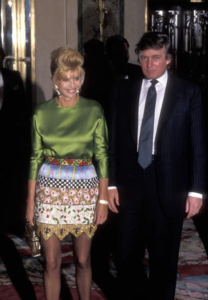 Donald Trump’s Golf Course Burial of Ivana Trump: A Financially Strategic Move?
Donald Trump’s Golf Course Burial of Ivana Trump: A Financially Strategic Move?
When Ivana Trump, the first wife of former President Donald Trump, passed away in July 2022, her final resting place raised more questions than condolences. Her grave is located near the first hole of Trump National Golf Club in Bedminster, New Jersey—a decision that, to many, seemed unusual. However, behind what appeared to be a personal or sentimental choice may lie a carefully calculated financial strategy with significant tax advantages.
At first glance, burying a family member on a private golf course seems unconventional. However, New Jersey law presents some unique incentives that could explain Trump’s decision. The state has extremely lenient rules when it comes to establishing private cemeteries, even on private land. More importantly, New Jersey offers substantial tax exemptions for land that qualifies as a cemetery. These include exemptions from property, income, and sales taxes. By establishing a cemetery company and designating a portion of the Bedminster golf course as a burial ground, Trump may have taken advantage of these tax breaks.
New Jersey tax law allows land used for a cemetery to be exempt from local property taxes. This means that if the section of the golf course containing Ivana’s grave is officially registered as a cemetery, that portion of the land could become tax-exempt. Furthermore, cemetery companies in New Jersey are also exempt from income taxes and sales taxes on goods like burial services or cemetery maintenance.
Although Trump has not publicly stated that this was his intent, it fits into a long pattern of financial maneuvering. Trump has often been praised—and criticized—for his aggressive use of legal loopholes to minimize taxes and increase profits. Over the years, he has used a variety of tax strategies, from classifying parts of his properties as agricultural land (by keeping goats on them) to declaring significant losses on his tax returns to reduce his federal tax liability.
There are other implications too. If the burial site is recognized as a cemetery, even beyond tax benefits, it could also provide the land with a type of legal protection. Cemeteries are notoriously difficult to relocate or develop. This could complicate future attempts by municipalities or other parties to claim or rezone the land. In this light, the burial might also serve as a form of land-use preservation, helping to secure Trump’s long-term control over the property.
Critics argue that using a loved one’s grave for tax advantage is a distasteful move, but supporters of Trump might see it as a savvy business decision. Ivana Trump was a prominent figure in Trump’s life and the mother of three of his children. Placing her grave at one of his favorite properties could easily be interpreted as a tribute. Still, when viewed through the lens of Trump’s financial history, the choice seems unlikely to be purely sentimental.
Interestingly, Trump has previously referred to Bedminster as his preferred final resting place as well. Plans had been filed years earlier to build a mausoleum and cemetery on the site, initially intended to be a large-scale burial ground for Trump family members and even members of the public. While those larger plans were scaled back, the groundwork—both literally and legally—was already in place.
In summary, while Donald Trump’s decision to bury Ivana Trump at Bedminster may have been personal, it also opens up a range of financial benefits under New Jersey law. Whether or not this was the primary motivation, it aligns closely with Trump’s long-standing practice of leveraging legal frameworks to his financial advantage. It’s a reminder that in the world of high-stakes real estate and politics, even the most emotional decisions can carry significant economic weight.
